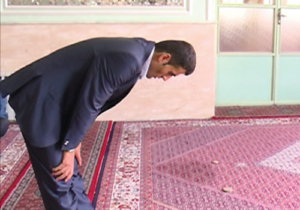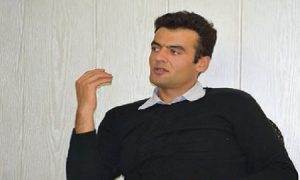The stifling frameworks that govern the Bahaism, have caused the hereditary transfer of neglect and ignorance from the Baha’i families to their children. However, the God-seeking nature of man and the contradictions in the Bahaism sect have led many Baha’is to move toward a correct understanding of the religion and the realities of the world. In this regard, many Baha’is have succeeded in renouncing this sect and climbing the ladder of human growth and excellence by embracing the truth of the religion of Islam. Navid Forsati Pour is one of these Baha’is who has converted to Islam. In an interview, he talks about how he became a Muslim.
*Please tell us a brief biography of yourself.
I am Navid Forsati Pour the son of Azizollah. I was born in 1364 in solar calendar (1985) in Zanjan. All my relatives and family members were Baha’is and for this reason, I knew nothing about the truth of Islam for years. However, since teenage years, I was not interested in the etiquette enforced by the establishment on the families and people of the cult and used every opportunity to escape from the cult’s circles and feasts.
*How is the situation of Baha’ism in Zanjan Province?
As we have been told, Zanjan once had the largest number of Baha’i families. I do not know to what extent this is true, but that was not the case when I was a Baha’i, and few Baha’is lived in Zanjan. I think there are only a few Baha’i families left in Zanjan now, who are also elderly.
*How is the situation of your family?
Most of my family members are Baha’is, except for my two aunts who converted to Islam many years ago. My uncle left Iran a few years ago to live in Canada, but fell ill and died in Turkey. His family buried him there, and they themselves, including my uncle’s wife and her children, sought refuge in Canada.
*What plans did the Baha’i establishment have for children?
Since childhood, they held classes known as Golshan for children younger than pre-school, or when we were seven years old, ethics classes were held in specific homes where children were taught lessons and etiquette in accordance with Baha’i teachings.
*How was your participation in the meetings?
Participation in meetings was compulsory, in a way that if someone was absent, they would warn him or her. These warnings lasted up to three times, and if a person was absent for more than three times, he would be rejected from the community and meetings. Of course, rejection at this stage was not as severe as mental and administrative rejection. But the same amount of rejection is hard for a child or teenager. Because I did not like the Baha’is, I did not attend much of their meetings and programs. That’s why I was more humiliated. Failure to attend the meetings caused the cult leaders to warn me, and sometimes even my family punished me physically, to the point that I took part in the Baha’i meetings after beatings and threats. I even had no value among the relatives because everyone knew I was against being a Baha’i.

*Please explain a little about the content of the meetings?
As I said, I rarely attended the meetings, but I remember once during Ziafat or the Feast, we went to visit my sister in Kermanshah, where she lives. In Kermanshah, due to the delay in the program, a Feast was held one or two days after the scheduled time, and since we were my sister’s guests, I also participated. The programs included music, competitions, prayers, children and teen programs, making puzzles, and more. The important thing is that they know very well how to make the meetings flourish so that people can pay attention. The feasts were rotatory and were held at one of the members’ homes each time. However, the Baha’is had no appeal to me. In fact, I can say that it did not give any meaning to my life. Even if the meetings were in our house, I would lock myself in a room or basement to escape them.
*Did non-attendance in these classes affect your life?
Not being active in the establishments had made me a frustrated, weak, and a kind of iron man. I did not have any happiness during my years as a Baha’i. I became more and more reluctant toward Baha’ism, and on the other hand, the hardships that were being inflicted on me by those around me were increasing; to the extent that my family members no longer counted on me, and as a young man, despite being 27 years old, I was not even allowed to leave the house and use any facilities. Because of my rejection of the Baha’ism and the behavior of those around me, I endured many hardships that even led me to do dangerous stubbornness as a teenager at a critical age, all of which hurt me a lot.
As I reached a young age and needed a sense of independence, I became acquainted with a new aspect of the limitations of the Baha’i Faith. An aspect that was really unbearable for me. I realized that even for the most personal issues of my life, such as choosing a spouse, I needed the sect’s permission and their selection and approval. The fact that my whole life and future is shaped by others, regardless of my real opinion, was like a spark that made me completely abandon the cult.
*How did you get familiar with Islam and become a Muslim?
We had been taught from childhood not to attend religious and Quranic classes and to find an excuse not to attend these classes in any possible way. By the time I was young, I had become somewhat familiar with Muslims and the religion of Islam because I went to Muslim schools, but when this boredom peaked, I seriously researched Islam. However, I am still getting acquainted and learning, and as a result of the same research, I realized and believed in the perfection of Islam. I endured many hardships on the way to embracing the truth of Islam. I was old enough to choose my own path, so I made my decision and left home in 2014. I was at an inn for a few nights. I didn’t even have money. One day, I explained my life to someone and said I wanted to become a Muslim and marry a Muslim girl. That person also guided me and I was able to become a Muslim openly and officially.
Although I had tended to convert to Islam about three years before the incident, I did not make it public due to some considerations. During this time, however, my family members were somewhat aware of my interest in Islam. Finally, in the summer of 2014, I publicly converted to Islam and went to Mr. Khatami, the Friday prayer leader of Zanjan province, to say Shahdatain or to testify that there is no God but Allah. After a while, I got familiar with a devout Muslim woman and started a new life. When I became familiar with my wife, Mrs. Zahra, she said that I accept you only because you recognized and chose Islam. That is why she accepted me despite my unemployment, lack of money and being alone. We held a simple wedding and started our common life with God’s help. Mrs. Zahra’s family are simple and at the same time religious people; a pure and kind family who are even more kind to me than their other son-in-laws. They have always been with us through all these hardships, and by providing the necessary conditions, they have given me hope in life.
After the wedding, my wife told me to go and see my parents, maybe they will accept Islam by seeing you. Zahra raised me like a newborn baby and taught me the rituals and practices of Islam. I did not know anything, not even saying Bismillah (In the Name of God). Zahra started from the beginning and I still learn a lot from her. I know it’s very tedious but she bears everything. When my wife prays and recites the holy Qur’an, I feel like I am in heaven.
*How do the Baha’is around you react after you convert to Islam?
Now, if any of my old acquaintances see me, they will make fun of me or make jokes about my becoming a Muslim. But it was my choice, and none of that matters to me. At present, my only wish is to travel to Karbala, which makes both my wife happy and I myself find the felicity of visiting Hazrat Aba Abdullah (PBUH).
https://mohtadyan.com/






